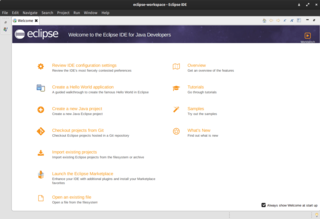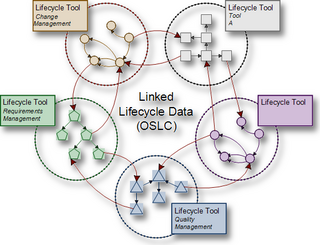Related Research Articles

Eclipse is an integrated development environment (IDE) used in computer programming. It contains a base workspace and an extensible plug-in system for customizing the environment. It is the second-most-popular IDE for Java development, and, until 2016, was the most popular. Eclipse is written mostly in Java and its primary use is for developing Java applications, but it may also be used to develop applications in other programming languages via plug-ins, including Ada, ABAP, C, C++, C#, Clojure, COBOL, D, Erlang, Fortran, Groovy, Haskell, JavaScript, Julia, Lasso, Lua, NATURAL, Perl, PHP, Prolog, Python, R, Ruby, Rust, Scala, and Scheme. It can also be used to develop documents with LaTeX and packages for the software Mathematica. Development environments include the Eclipse Java development tools (JDT) for Java and Scala, Eclipse CDT for C/C++, and Eclipse PDT for PHP, among others.

Gregor Kiczales is an American computer scientist. He is currently a professor of computer science at the University of British Columbia in Vancouver, British Columbia, Canada. He is best known for developing the concept of aspect-oriented programming, and the AspectJ extension to the Java programming language, both of which he designed while working at Xerox PARC. He is also one of the co-authors of the specification for the Common Lisp Object System, and is the author of the book The Art of the Metaobject Protocol, along with Jim Des Rivières and Daniel G. Bobrow.
William G. Griswold is a professor of Computer Science and Engineering at the University of California, San Diego. His research is in software engineering; he is best known for his works on aspect-oriented programming using AspectJ and on finding invariants of programs to support software evolution.

Carnegie Mellon Silicon Valley is a degree-granting branch campus of Carnegie Mellon University located in the heart of Silicon Valley in Mountain View, California. It was established in 2002 at the NASA Ames Research Center in Moffett Field.
The Doctor of Engineering is a professional doctorate in engineering and applied science. An EngD is a terminal degree similar to a PhD in engineering but applicable more in industry rather than in academia. The degree is usually aimed toward working professionals.
Notable issue tracking systems, including bug tracking systems, help desk and service desk issue tracking systems, as well as asset management systems, include the following. The comparison includes client-server application, distributed and hosted systems.
John Spencer MacDonald, was a Canadian engineer, businessman, and academic. He was co-founder of MacDonald, Dettwiler and Associates (MDA), an aerospace, information systems, and technology company. MacDonald served as the chancellor at the University of Northern British Columbia from 2010 through 2016.

The Public Knowledge Project (PKP) is a non-profit research initiative that is focused on the importance of making the results of publicly funded research freely available through open access policies, and on developing strategies for making this possible including software solutions. It is a partnership between the Faculty of Education at the University of British Columbia, the Canadian Centre for Studies in Publishing at Simon Fraser University, the University of Pittsburgh, Ontario Council of University Libraries, the California Digital Library and the School of Education at Stanford University. It seeks to improve the scholarly and public quality of academic research through the development of innovative online environments.
Ronald Baecker is an Emeritus Professor of Computer Science and Bell Chair in Human-Computer Interaction at the University of Toronto (UofT), and Adjunct Professor of Computer Science at Columbia University. He was the co-founder of the Dynamic Graphics Project (DGP), and the founder of the Knowledge Media Design Institute (KMDI) and the Technologies for Aging Gracefully Lab (TAGlab) at UofT. He was the founder of Canada's research network on collaboration technologies (NECTAR), a founding researcher of AGE-WELL, Canada's Technology and Agine research network, the founder of Springer Nature's Synthesis Lectures on Technology and Health, and the founder of computers-society.org. He also started five software companies between 1976 and 2015. He is currently an ACM Distinguished Speaker.
Aleksandra Dulic is a Serbian Canadian painter, animator, media artist and scholar. Aleksandra is an associate professor in Creative Studies at the University of British Columbia (UBC), serving as Director of the Centre for Culture and Technology at (UBC). She is Visiting Professor at the University of Arts in Belgrade. In 1998 Aleksandra received BFA from University of Arts in Belgrade, MFA from the School for the Contemporary Arts in 2000 and Ph.D. from the School of Interactive Art and Technology in 2006 from Simon Fraser University, in British Columbia, Canada.

The BC Tech Association, formally the British Columbia Technology Industry Association (BCTIA), is a not-for-profit member-funded trade association in British Columbia, Canada, which promotes the technology industry in the province. The technology industry in BC has been growing steadily since the late 1990s and constituted 5.9% of British Columbia's economic output in 2007.
Adam Scott Radomsky is a Canadian psychologist who studies obsessive-compulsive disorder (OCD) and related anxiety disorders. He is a professor in the Department of Psychology at Concordia University in Montreal, Canada, and was editor-in-chief of the Journal of Behavior Therapy and Experimental Psychiatry.
The task-focused interface is a type of user interface which extends the desktop metaphor of the graphical user interface to make tasks, not files and folders, the primary unit of interaction. Instead of showing entire hierarchies of information, such as a tree of documents, a task-focused interface shows the subset of the tree that is relevant to the task-at-hand. This addresses the problem of information overload when dealing with large hierarchies, such as those in software systems or large sets of documents. The task-focused interface is composed of a mechanism which allows the user to specify the task being worked on and to switch between active tasks, a model of the task context such as a degree-of-interest (DOI) ranking, a focusing mechanism to filter or highlight the relevant documents. The task-focused interface has been validated with statistically significant increases to knowledge worker productivity. It has been broadly adopted by programmers and is a key part of the Eclipse integrated development environment. The technology is also referred to as the "task context" model and the "task-focused programming" paradigm.
Murray Goldberg is a noted Canadian educational technologist and a faculty member in the Department of Computer Science at the University of British Columbia in Vancouver, Canada. Goldberg is best known for being the founder of the elearning companies WebCT, Brainify, Silicon Chalk, AssociCom, and Marine Learning Systems. Goldberg was born in Calgary, Alberta, Canada and raised in Edmonton. He moved to British Columbia to attend the University of Victoria in 1980. Murray graduated from UVic in 1985 and then went on to earn an MSc from the University of British Columbia. In 2004 he was awarded an honorary Ph.D. from the Southern Cross University. Murray serves as director for various companies, sits on the board of trustees of Harvey Mudd College in Claremont California, is a mentor at the GSV Labs tech incubator in Redwood City California, and is a frequent consultant and speaker on the future of eLearning. Murray is also the chair of the British Columbia chapter of the Manning Innovation Awards.
DevOps is a methodology in the software development and IT industry. Used as a set of practices and tools, DevOps integrates and automates the work of software development (Dev) and IT operations (Ops) as a means for improving and shortening the systems development life cycle.
Andrew Rivkin is a Canadian investor and entrepreneur. Rivkin is best known as the co-founder of CryptoLogic, a pioneering online casino software company, and FUN Technologies, one of the world's largest providers of casual games and fantasy sports.
A. Lakshman Rao is the former Chief Operating Officer of Wipro Technologies. Rao joined Wipro's Information Technology business as a founder member in 1980 and contributed significantly towards building a R&D team. From 1993 to 1996, he worked as Vice President (Technical) at Wipro Systems and played an important role in building competence in Client/Server and Object technologies. During this period, he was instrumental in building a number of business practices from scratch. Testing services, business intelligence, data warehousing and e-Enabling are some of them. As group vice president and chief technology officer of Wipro from 1996 to 1999, he implemented ISO 9000 compliant quality processes across the Software Divisions of Infotech Group. He has also driven the SEI CMM initiative enabling Wipro to become the first SEI CMM Level 5 Software Services Company in the world. In Oct 2000, Rao took over the leadership of Telecom and Internetworking Solutions Division and steered the business through multifold growth to its present prominent position.

Open Services for Lifecycle Collaboration (OSLC) is an open community, originally proposed in 2008, to define a set of specifications that enable integration of software development. It has evolved, and continues to evolve, to areas such as Application Lifecycle Management (ALM), Product Lifecycle Management (PLM), IT Operations and more. The intention is to make life easier for tools users and tools vendors, by making it easier for tools to work together.

Oyekunle Ayinde "Kunle" Olukotun is a British-born Nigerian computer scientist who is the Cadence Design Systems Professor of the Stanford School of Engineering, Professor of Electrical Engineering and Computer Science at Stanford University and the director of the Stanford Pervasive Parallelism Lab. Olukotun is known as the “father of the multi-core processor”, and the leader of the Stanford Hydra Chip Multiprocessor research project. Olukotun's achievements include designing the first general-purpose multi-core CPU, innovating single-chip multiprocessor and multi-threaded processor design, and pioneering multicore CPUs and GPUs, transactional memory technology and domain-specific languages programming models. Olukotun's research interests include computer architecture, parallel programming environments and scalable parallel systems, domain specific languages and high-level compilers.
Clio is a legal technology company headquartered in Burnaby, British Columbia. Clio offers law firms cloud-based software that handles various law practice management tasks including client intake, contact management, calendaring, document management, timekeeping, billing, and trust accounting.
References
- 1 2 "Kersten develops Mylar". 2008. Archived from the original on 2007-01-01. Retrieved 25 Sep 2008.
- ↑ "Kersten Leads Mylar". 2008. Archived from the original on 2007-12-18. Retrieved 25 Sep 2008.
- ↑ "Tasktop Team". 2008. Retrieved 25 Sep 2008.
- ↑ "Mik Kersten Thesis" (PDF). 2008. Archived from the original (PDF) on 2012-02-12. Retrieved 25 Sep 2008.
- ↑ "Tasktop About". 2008. Archived from the original on 2008-02-05. Retrieved 25 Sep 2008.